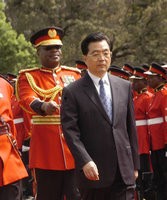WPR's The New Rules: China Still Needs U.S. in Global Security Role
 Monday, September 20, 2010 at 8:37AM
Monday, September 20, 2010 at 8:37AM 
When Europe ran the world, trade followed the flag, meaning that globalization in its initial expression -- otherwise known as colonialism -- grew out of the barrel of a gun, to paraphrase Mao Zedong. On this subject, Franklin Roosevelt and Vladimir Lenin agreed, even if that conclusion led them to embrace diametrically opposed strategies: FDR's realization that "the colonial system means war" drove him to erect an international liberal trade order following World War II that doomed the vast colonial systems of his closest European allies. Roosevelt's success not only enabled America to contain and ultimately defeat the soul-crushing Soviet alternative, it laid the initial groundwork for today's American-style "open door" globalization, itself a nod to cousin Theodore. In the end, that "traitor to his class," as Roosevelt was often labeled, should rightfully be acknowledged as the single-most successful anti-imperialist revolutionary leader of the 20th century.
Read the entire column at World Politics Review.
I just participated--this morning--in my first virtual meeting of the Geopolitical Risk Global Agenda Council of the World Economic Forum as led by Eurasia Group CEO Ian Bremmer. I wrote this piece in anticipation of that, in effect offering my definition of the biggest geopolitical risk I could imagine: "declining" or "retreating" America + rising-but-pol-mil-weak China = a system whose revealed risk could suddenly spike. How so? Some scenario comes along that confirms US impotence or unwillingness to step into any new breaches, while likewise confirming the "paper tiger" nature of the PLA (shiny weapons + no experience makes Wang a tentative soldier). Then the question is, what or who steps into this breach? Rising secondary powers? Underpowered and/or atrophied international organizations? Or, most likely, is that breach simply left wide open, revealing the true macro geopol risk in the system--namely, that we stand astride a transition from an overburdened and overleveraged superpower to an inexperienced and lacking-in-will-and-political resilience newcomer? And what is the possibility of alliance between the two at this time? Poor indeed. You pile that geopol "revealed risk" on top of a fragile global recovery, and that's a dangerous mix.
 China,
China,  US Military,
US Military,  US foreign policy | in
US foreign policy | in  WPR Column |
WPR Column |  Email Article |
Email Article |  Permalink |
Permalink |  Print Article
Print Article 









Reader Comments (1)
It might be interesting to see how China's historians reflect on old time USA and European use of military showcases to get Asian establishments to see value in globalization opportunities of that time.
Examples: the Great White Fleet showcase, and the Jesuit showcase of European weapons, to get Japan's samurai guys to see the benefits for them of economic modernization and globalization.
On the other hand, the Dutch had an earlier virtually invisible academic and social outreach to emerging Japanese intellectuals that not only portrayed Western science, technology etc., but the historical processes that produced them. That low key, but thoughtful, effort was a more significant influence on motivating Japanese elite to find its own outreach strategy.
As a side bar insight, those leaders also saw, from the Dutch info, the emerging American nation as a likely future problem for Japan. The later White Fleet exercise did a lot to confirm the earlier insight. So today we need to think deeper before acting the big Leviathan.